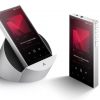One box does it all
The RX-Z1 is Yamaha’s current top-of-line receiver. While it is one of the most expensive receivers on the market, it is still priced over a thousand dollars less than its competitor’s flagship receivers. However, does the RX-Z1 represent a good value in the high-end ($2,000+) receiver market? For starters, the all-in-one box does just about everything a receiver can do and then some. It decodes every current 5.1 and 6.1 surround format, and adds Yamaha’s proprietary Cinema DSP, offering a mind boggling 41 sound fields in 61 variations. There are plenty of options for connecting and switching all of your A/V equipment. So you will have no problem switching component video for up to three HDTV sources or using any one of its 10 digital audio (6 optical, 3 coaxial, 1RF) inputs.
Too many features to count
The list of features would easily fill up a few pages. Instead I will list some of its most important features:
Sounds awesome so far
Yada, yada, yada… Enough tech jargon. So how did this baby sound? Grrrrrreat! It easily beats out any sub $1000 receiver in sound quality. I immediately noticed pinpoint imaging, better channel separation and improved dynamics. The receiver instantly pumped new life into my surround speaker system.
Easy on-screen setup
Configuring the receiver was a breeze with guidance from its on-screen menu and built-in test tone generator. I especially liked the surround setting screen which automatically calculates the surround speaker delay, based on the distance of each speaker from the main seating position.
Not for the beginner
To the novice, this receiver can be a bit overwhelming. There are so many settings, jacks and surround modes that it is easy to get confused. For example, there is parametric equalizer that can control the frequency response for each speaker individually. If you really know what you’re doing, the capability is there, but most people should probably leave this setting alone.
Settings memorized
Once the receiver is setup properly, you’re done. Configure different surround settings for watching TV, DVDs, or music and it remembers each setting when you switch to different components. Chalk up a plus for usability!

Mission Control
The remote control resembles a palm pilot instead of a standard push-button remote. The remote (RAV-2000) is a backlit LCD touch screen display. It’s fully programmable and easily learned commands from my other remotes. The remote was not difficult to program or use, but it’s ergonomics were lacking. It was too bulky for my taste and definitely not for the technically challenged. I am not a fan of touch screen remotes, because they usually require two hands to operate and you can’t feel the texture and locations of the buttons. Also, I am still hooked on the Harmony Remote. The RAV-2000 remote’s biggest flaw is the absence of a channel up/down button on the outside panel.
Uh, oh
Now for my problems. Yes, you heard me right. Something this expensive shouldn’t have any problems, right? When watching DVD’s or satellite (DirecTV) programming the sound would intermittently dropout for no apparent reason. It was noticeable after changing channels, but was most annoying while watching a movie. It could have been my other equipment, but I wasn’t able to duplicate the problem on another (non-Yamaha) receiver. I am curious to know if anyone else has experienced the same problem? I notified Yamaha of my problem and here is their response:
The dropout issue occurs when the decoder “looses” the DD digital bitstream. As you know, satellite transmissions are highly susceptible to outside influences such as weather patterns, the location of the receiving unit, solar activity, and the strength of the incoming signal. When a signal loss occurs, the RX-Z1 reverts to DPL, and then back to DD when the signal is reacquired. This switching causes a brief loss of signal. This will happen in any unit with a DD decoder. It is the source causing the dropout. As for it happening on a source DD/DTS disc, make sure that the disc is clean and free from fingerprints, etc. Also, note if the dropout occurs at the same spot on the disc each time. That would indicate a flaw in the disc (scratch or inability to read the info on the disc).
Surround EX snag
The receiver had no problem automatically recognizing any surround sound format, except Dolby Digital EX. To enable Dolby Digital EX on all of my EX encoded DVDs I had to manually select the EX option from the remote control menu. Then it decoded the sound flawlessly. For non-surround or stereo TV watching the DTS Neo:6 Cinema setting was remarkably very movie-like. It became my default setting over Pro-Logic II.
Bonus effects
The Yamaha receiver comes with two extra built-in amplifiers you won’t find in other receivers. Yamaha uses these extra amps for front effect speakers. The extra speakers were placed in front of the room above the main speakers. These speakers are not required for 5.1 or 6.1 speaker surround sound, but Yamaha claims the effect processing adds realism and creates a better movie theater-like experience. I had always been skeptical of Yamaha’s front effect sounds, and my tests confirmed my suspicions. The use of effect speakers was minimal, if any, and only seemed to add echo to the room even though they did expand the sound field. The added cost alone of two extra speakers does not justify its use to me. It is a nice option to have if you enjoy the sound, but most likely will not be used.
Hear this
I do want to reiterate this is an incredible sounding receiver. At low volumes it was very accurate while still maintaining precise details. When you crank it up, each of the six 130-watt internal amps had no problem keeping pace. There was never a sign of harshness or distortion at any listening level.

THX worthy?
Now are you ready for the kicker. The RX-Z1 is NOT THX! Big whoop, I say. This doesn’t mean the receiver doesn’t meet a THX standard, it just means it has not been certified and tested by THX. Therefore Yamaha can lower its cost by avoiding the THX license fee. I am willing to bet this receiver sounds better than most THX receivers.
Almost perfect
The RX-Z1 was 95% flawless. Although for $2799 MSRP I would insist on perfection. The problems I encountered are my biggest criticism, and may not be common. On the other hand, the RX-Z1 comes with so many extras and features, it is certain to satisfy just about any audio or movie lover.
Remember I am just one man with one opinion. If you own any of this product, or have a comment or question feel free to add your thoughts below.
Brian Mitchell
Founder & CEO
eCoustics.com
































